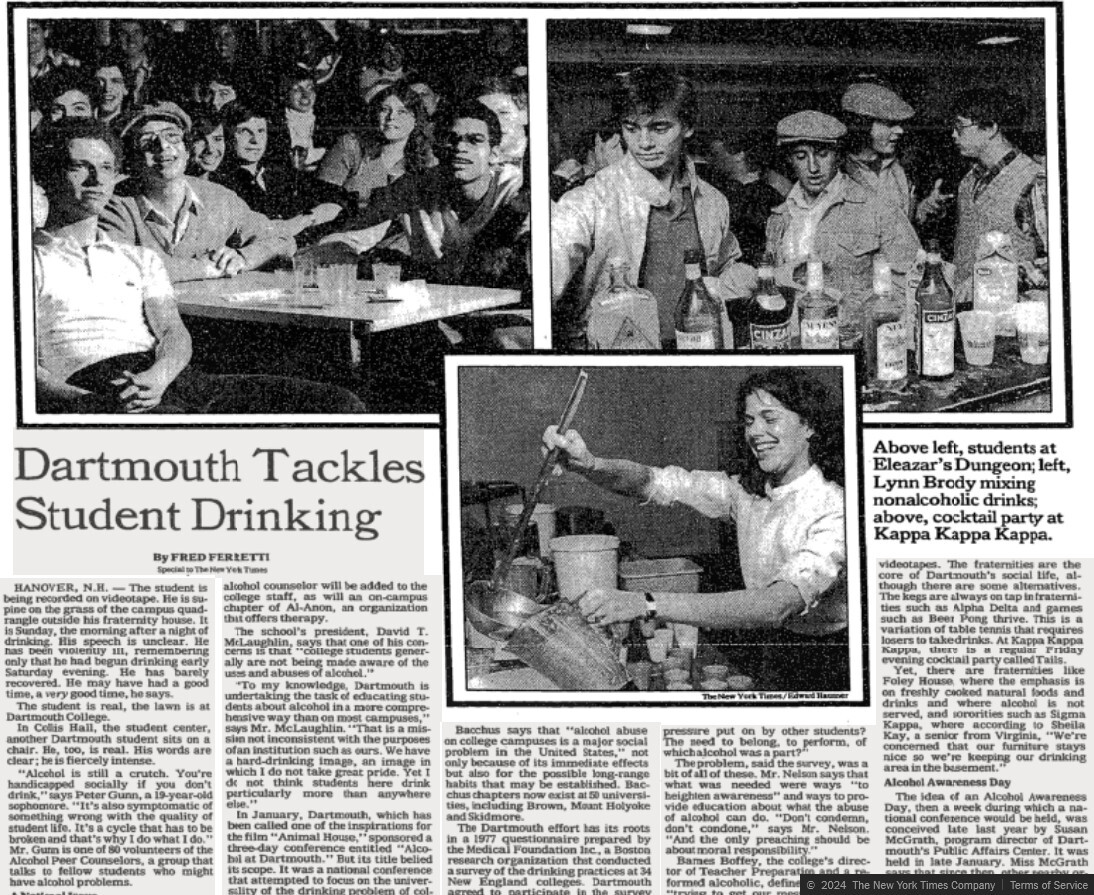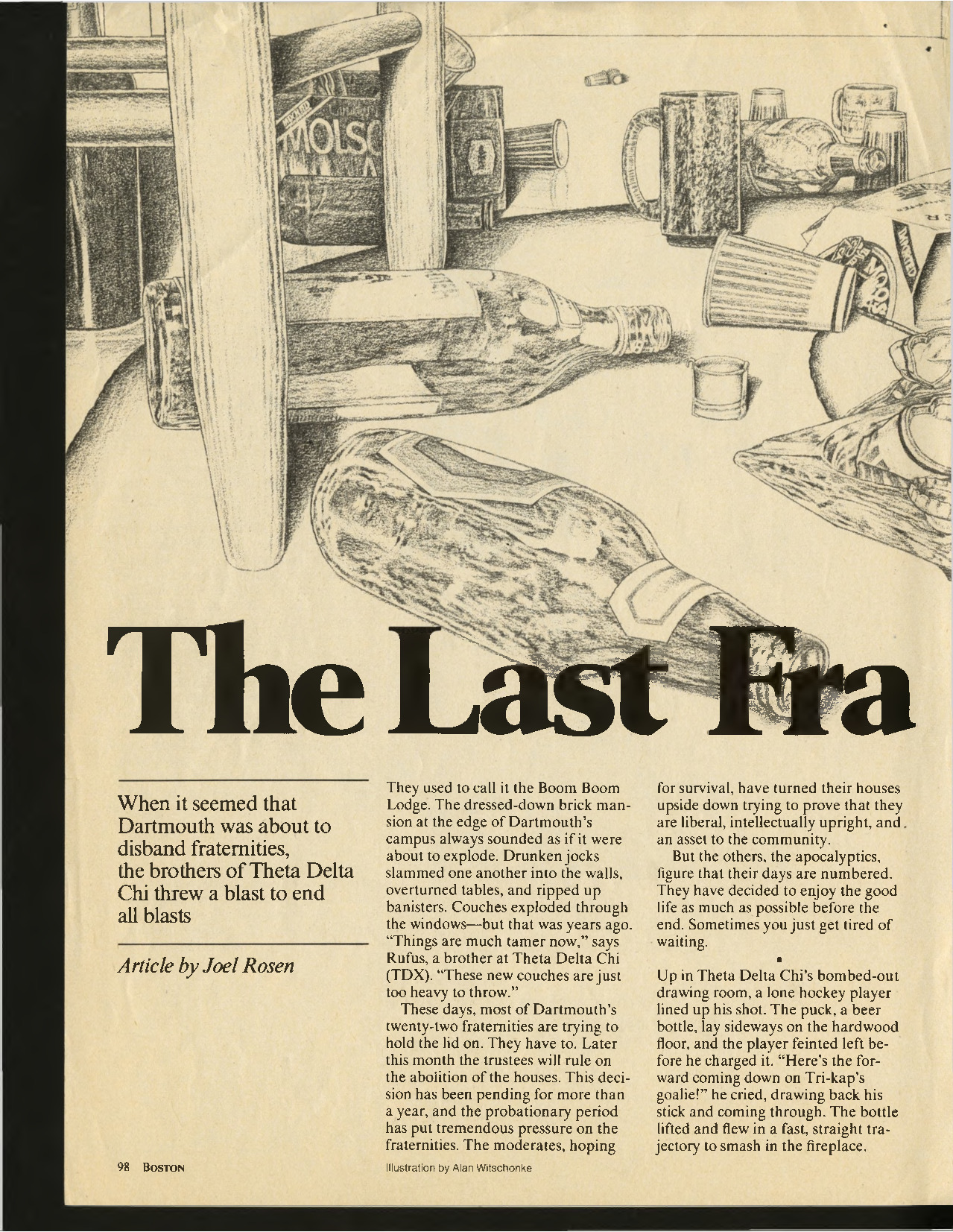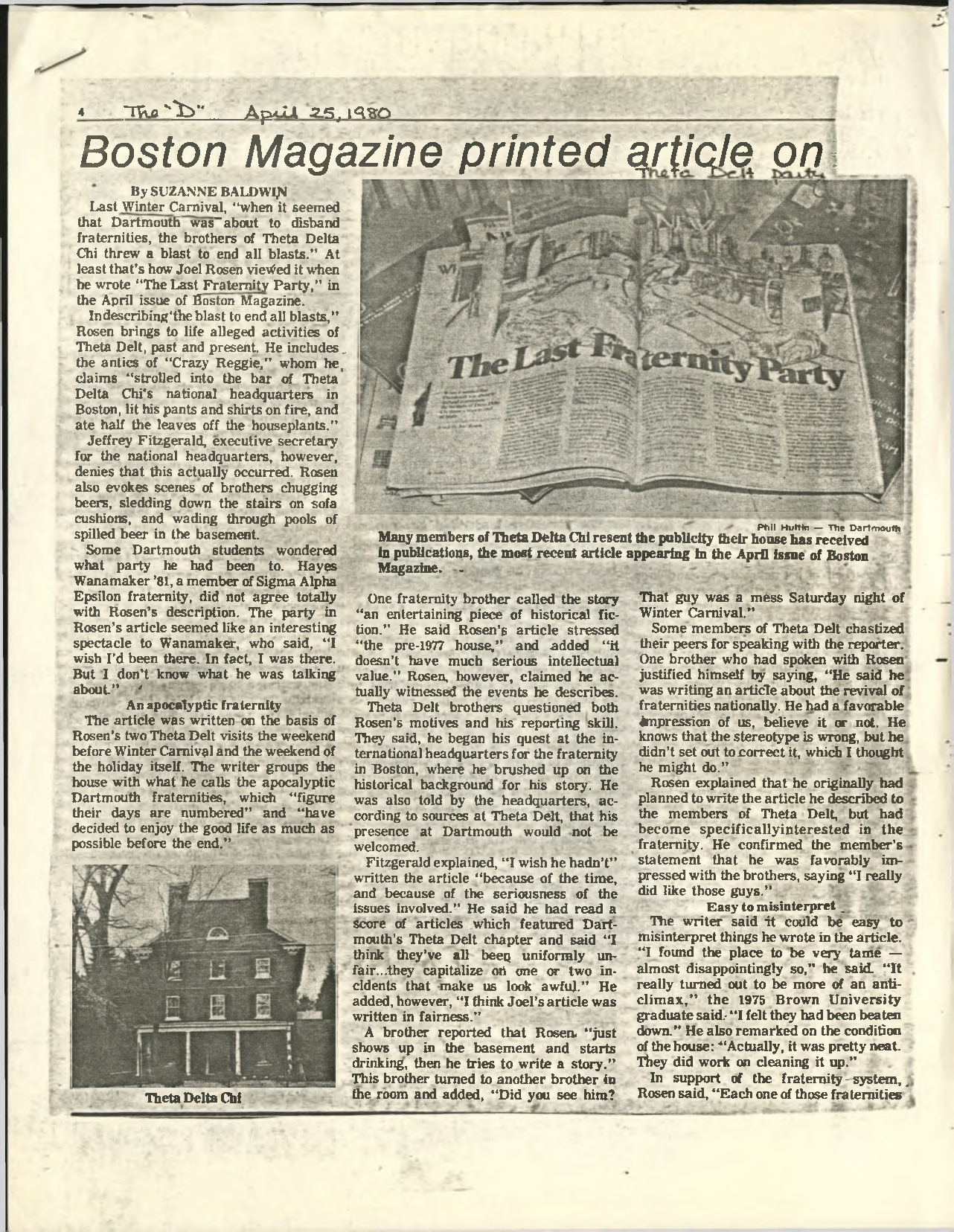Hangover, NH: An Outsider's Perspective
The first file that I requested when I arrived to campus to begin this research was the Vertical File “Drinking 1.” Curated by library staff to provide an overview of the topic of ‘drinking,’ one of the most interesting parts of the folder was not a document inside it, but instead a sticker that had been stuck to the outside. It read: “From time to time it has been stated that Dartmouth men have been cited as the most alcoholic in the Ivy Leagues. This has never been proven, and no survey has ever been made which would support these statements.” This quote also appeared in a newspaper article from The Dartmouth shown earlier in this exhibit titled “Dartmouth’s reputation for drinking is rooted in its heritage.” In an archive like Rauner Special Collections Library, it's uncommon to find that the container for records takes a stance on the subject, and I think it’s a good segue to understanding more about Dartmouth’s drinking image that is understood outside the Dartmouth bubble.
Besides the deep traditions and mythology associated with alcohol on Dartmouth’s campus at the time, Dartmouth was also gaining recognition nationally for it’s specific fraternity culture. Hanover had long been nicknamed Hangover, NH by Northeasterners. Chris Miller’s Animal House publicized a fresh image of Dartmouth's Greek Life thats difficult to forget. Paired with the Epperson Proposal–believed to have been triggered by the release Animal House–generated a story of dissension on campus. Various news outlets took the lead, spreading Dartmouth’s dispute over Greek Life across the nation.
Esquire’s "Hanging on (By a Jockstrap) to Tradition at Dartmouth" written by University of New Hampshire Professor Andy Merton was the most critical of all the press, lambasting the fraternity system for enabling sexual assualt, sexism, and alcohol abuse. Merton’s concern was for the women of Dartmouth who arrived to campus to find a culture of masculine camaraderie formed around fraternities that was resistant to change.
“If you’re having a good time you get drunk. If you’re not, you get drunk.”
- Dartmouth co-ed who ended up withdrawing, reported on by Andy Merton in "Hanging on (by a Jockstrap) to Tradition at Dartmouth"
Many writers took the side of Professor Epperson, reporting on Dartmouth’s ‘last years’ of fraternity life. Joel Rosen’s The Last Fraternity Party spoke to this trend. Published in the Boston Magazine, Rosen’s portrait of Theta Delta Chi revolved around alcohol use and destructive behavior. This image was later contested in The Dartmouth by TDXs who claimed that Rosen misrepresented his time at the house.
For every article that discussed the deplorable conditions of the fraternity system at Dartmouth, there were brief mentions of Foley House as a social alternative that existed outside of this image. In Merton’s Esquire article, Foley House was recognized for their non-alcoholic social events, community kitchen, and absence of a pledge period. On the national stage, Foley House stood as the face of a future Dartmouth social scene that was inclusive and intellectual.
Dartmouth as a whole eventually earned positive press for efforts taken to curb alcohol abuse. As discussed earlier, the Alcohol Concerns Committee had many different tasks. Among the jobs of creating a new alcohol policy and educating the student population about the dangers of alcohol abuse, the ACC also played an important role in publicizing facts about Dartmouth’s drinking behavior, dispelling rumors, and managing publicity. Steve Nelson, as chairman of the ACC and Director of Student Activities at the Collis Center, disseminated brochures and alcohol awareness education materials to colleges across the country that viewed Dartmouth as a model program. Such dispersion of resources gained notoriety for Dartmouth’s alcohol awareness program, as highlighted in the New York Times article linked below.
Still, just one year later, the New York Times Selective Guide to Colleges reinforced Dartmouth’s drinking reputation: "'No other school attracts students with the stamina to drink themselves into oblivion one day and to partake in some of the best liberal arts schooling in the nation the next.” Since the 1980s, Dartmouth administration has struggled to corral alcohol use on campus and combat Dartmouth’s drinking image.
"From time to time it has been stated that Dartmouth men have been cited as the most alcoholic in the Ivy Leagues. This has never been proven, and no survey has ever been made which would support these statements.”
One of the Alcohol Concern Committees important findings was that Dartmouth students do not in fact drink more than the average American college student. However, with the centrality of fraternities hold on alcohol and the traditions associated with drinking, that has never felt the case.
[1] Andy Merton, “Hanging On (By a Jockstrap) to Tradition at Dartmouth,” Esquire, June 19, 1979, 57, https://classic.esquire.com/article/1979/6/19/hanging-on-by-a-jockstrap-to-tradition-at-dartmouth.
From the Archives
Click on an image to access the full document, audio-visual components, and/or metadata associated with that item.

Published in April 1982, this piece in the New York Times reported on the work of the Alcohol Concerns Committee at Dartmouth. Author Fred Ferretti connected national awareness surrounding alcohol abuse to Dartmouth's specific relation to Animal House and Norman Carpenter, ultimately delivering an optimistic view on the work of the ACC.

Pubished in the Boston Magazine, this article is Joel Rosen's acocunt of spending time at Theta Delta Chi for winter carnival weekend. Framed by the Epperson Proposal, Rosen wrote about TDX as one of the last vestiges of the traditional Dartmouth fraternity experiece.

Written by Suzanne Baldwin, this article published in The Dartmouth on April 25, 1980 cast doubt on the accuracy Joel Rosen's portrayal of TDX in his article "The Last Fraternity Party." Members of TDX found the article to cherry-pick incidents of fraternity debauchery and thought that it added to existing negative press surrounding Dartmouth fraternities.
 Historical Accountability Student Research Program
Historical Accountability Student Research Program